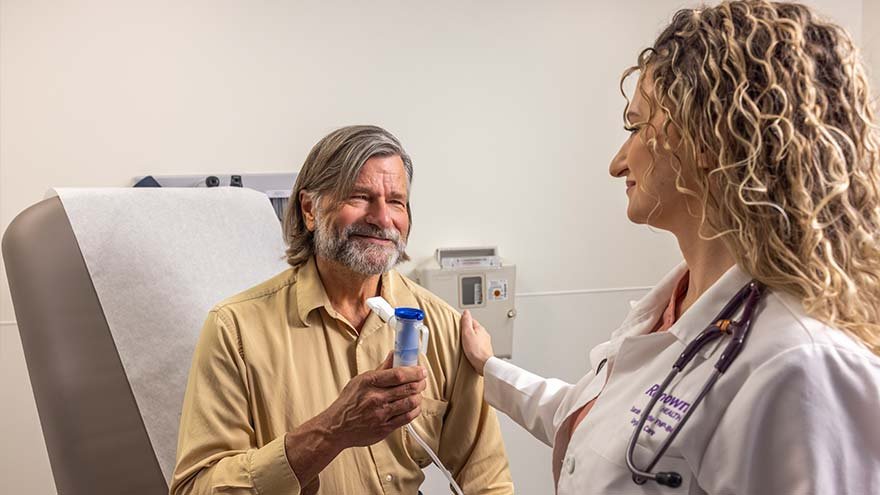

As this season beckons more time in the great outdoors for all ages, the risk of bug bites from simply being outside more often also increases. “While many bug bites cause nothing more than an annoying itch or bump, in some cases, they can pose more serious health risks if not treated promptly,” says Dr. Russell Stodtmeister, a family medicine physician with Renown Health.
What bug bites should I be on the lookout for this summer?
While this is not an exhaustive list of all bug bites to be aware of, the following bites are increasingly common during the summer months:
- Mosquito bites: Itchy, red bumps or rashes. Most cause mild irritation and resolve within a few days. Mosquitoes can often be found in standing water, such as ponds and storm drains. In some parts of the world, mosquitoes can be carriers of diseases such as malaria and yellow fever.
- Washoe County Disease Risks: Mosquitoes in the area may carry viruses that can cause West Nile Virus, St. Louis Encephalitis and West Equine Encephalitis, according to the Washoe County Health District (WCHD).
- Tick bites: Swollen, brown or red spots that can often burn or blister. Ticks live outside in greenery and can stay on your skin for an extended period of time. They can also cause Lyme disease, which will first manifest in a bullseye rash. Ticks also hold several other emerging diseases as scientists discover new pathogens. Learn more about five new tick-borne diseases from IGeneX, a leader in tick-borne disease testing.
- Washoe County Disease Risks: WCHD advises residents to stay aware of symptoms of Lyme Disease caused by ticks, as early detection can prevent long-term illness. The Center for Disease Control and Prevention (CDC) outlines more information about detecting Lyme Disease.
- Bee stings: Itchy red spot surrounded by a larger, swollen white spot. Contrary to popular belief, many bees, with the exception of honeybees, can actually sting the skin twice. They are commonly found around colorful flowers and moisture.
- Spider bites: Two raised, itchy “bubbles” or blisters that may be red, yellow or clear. Spiders are commonly found inside shelter (such as a house or box), and most are not dangerous; however, bites from venomous spiders, such as the brown recluse or black widow, should be treated by a medical professional as soon as possible. More information on venomous spider bites can be found on the Center for Disease Control and Prevention’s workplace safety and health section.
- Fire ant stings: Painful red spots and a blister, often in a cluster (fun fact: fire ants sting together in swarms). Most irritation will clear up after a week. Fire ants are usually found on top of animals or in farms and crops.
What can I do to protect myself against bug bites?
The good news is – many of the preventative measures we take to protect ourselves from the sun’s harmful rays are the same measures you can take to protect yourself against bug bites. This means that your outdoor protection routine doesn’t need to change too much. Dr. Stodtmeister notes a few top tips for optimal bug bite protection.
- Wear breathable protective clothing that covers as much of your skin as comfortably possible, especially if you will be spending any time in grassy or woodsy areas.
- Along with sunscreen, use a bug repellent spray. If possible, use a sunscreen/bug spray combination so you get both sun and bug protection in one. The American Academy of Dermatology recommends a bug spray that contains 20 to 30 percent DEET.
- Be aware of your surroundings and stay away from nests, hives and standing bodies of water.
If I notice a bug bite, what should I do?
Bug bites are common, especially in the summertime. Chances are, you will notice one on your skin or someone else’s skin sometime or another. “Swift attention to the bite or sting can prevent further discomfort and health issues,” says Dr. Stodtmeister.
5 tips to treat the common bug bite:
- If there is a stinger in the skin, such as the stinger from a bee, gently remove it with a flat-edged surface (tweezers should not be used). Clean the area of the bite with gentle soap and water.
- Use an ice pack to reduce swelling and keep the affected area elevated.
- Apply hydrocortisone cream or antibiotic ointment to help treat the area and prevent blistering.
- Take antihistamine to reduce itching and other allergy symptoms. If needed, take a pain reliever such as acetaminophen or ibuprofen.
- Avoid scratching the area, as this can irritate the bite more and slow down recovery.
It’s also vital to watch for any signs of an allergic or otherwise adverse reaction, especially symptoms that quickly or gradually become worse. If you notice body aches, headaches, fever, difficulty breathing, abnormal blood pressure, or rapid heart rate, seek medical attention immediately.
Dr. Stodtmeister leaves us with a good reminder for treating yourself and protecting yourself and loved ones against bugs and bug bites: “Vigilance is key, especially during the summer. Wear sunscreen with an SPF of at least 30, wear bug spray if you plan to be in nature and greenery for extended periods of time and monitor your skin for abnormal bumps and growths. Most of all, don’t be afraid to fully embrace your time outdoors.”
If you have a specific bug bite concern and would like direct medical advice, follow up with your primary care physician.
Related Blogs


7 Common Urgent Care Myths—Debunked by a Renown Expert
